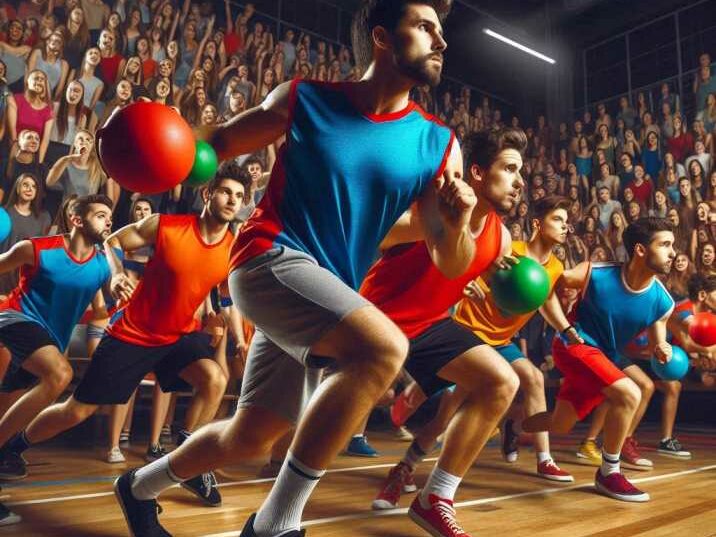Introduction
Table of Contents
Dodging, ducking, dipping, and diving—dodgeball is a game most of us remember from our school days. But as it gains popularity in various leagues and competitions, a question arises: is dodgeball a sport? This blog post aims to explore the characteristics that define a sport and whether dodgeball fits into this category. If you’re a fan of dodgeball or just curious about its status, you’re in the right place. We’ll break down the history, rules, physical demands, and cultural impact of dodgeball to determine if it qualifies as a sport.

Is Dodgeball a Sport?: Understanding What Makes a Sport
To determine Is Dodgeball a Sport? we first need to understand what qualifies an activity as a sport. Typically, sports are characterized by:
- Physical exertion
- Skill and strategy
- Competitive nature
- Formal rules and regulations
- Organized leagues and competitions
By examining dodgeball against these criteria, we can see if it meets the standard definitions of a sport.
Dodgeball’s History and Evolution
While many of us know dodgeball from gym class, its origins are far more diverse and ancient. Dodgeball-like games have been played for centuries, often as training drills for warriors. In the modern era, dodgeball became formalized in playgrounds and eventually turned into a competitive activity. Understanding its evolution helps us appreciate its complexity and validity as a sport.
Ancient Origins
The earliest forms of dodgeball were played in Africa over 200 years ago, not for fun but as a harsh training exercise with rocks and other harmful objects. This brutal version was intended to train warriors and test their endurance.
Playground Phenomenon
In the mid-20th century, dodgeball found its way into American schools as a popular playground game. Its simple rules and minimal equipment made it accessible to everyone.
Modern Leagues
Today, dodgeball has evolved into a highly organized activity with national and international leagues, professional teams, and even world championships. This organized structure is one of the key characteristics of a sport.
Physical and Mental Demands
For an activity to be classified as a sport, it must require physical exertion and mental prowess. Dodgeball certainly meets these criteria.
Physical Exertion
Dodgeball requires quick reflexes, agility, strength, and endurance. Players must constantly move, throw, and dodge, making it a physically demanding activity.
Skill and Strategy
Effective dodgeball players use various strategies, including coordinated team attacks, deceptive throws, and defensive maneuvers. Mastering these skills requires practice and tactical thinking.
Competitive Nature
Like other sports, dodgeball is inherently competitive. Teams and players aim to win, often through organized tournaments and leagues.
Rules and Regulations
Another hallmark of a sport is a set of formal rules and regulations. Dodgeball has its own comprehensive rulebook, which governs gameplay, player conduct, and equipment standards.
Basic Rules
The fundamental rules of dodgeball involve two teams, usually with six players each, who try to eliminate opponents by hitting them with a ball or catching a thrown ball. The game continues until one team has eliminated all the players on the opposing side.
Official Rulebooks
Organizations like the World Dodgeball Federation (WDBF) and National Dodgeball League (NDL) have established detailed rulebooks, covering everything from court dimensions to the types of dodgeballs used.
Organized Leagues and Competitions
Formal leagues and competitions are essential elements of any recognized sport, and dodgeball has plenty of both.
National Leagues
Countries like the USA, Canada, and the UK have national dodgeball leagues with various divisions and tournaments, showcasing the best talent in the sport.
International Competitions
The WDBF organizes the Dodgeball World Cup, where teams from around the globe compete for the title of world champions. This level of international competition is indicative of a legitimate sport.
Community and Cultural Impact
Sports often have a significant cultural impact and foster community spirit. Dodgeball has achieved this in various ways.
Social Engagement
Many local dodgeball leagues engage communities by hosting charity events, social gatherings, and youth programs, promoting physical fitness and social interaction.
Media Exposure
Movies like “Dodgeball: A True Underdog Story” and TV shows featuring dodgeball have increased the sport’s visibility and popularity, contributing to its cultural relevance.
Conclusion
Is Dodgeball a Sport? After examining dodgeball through the lens of physical exertion, skill, competitive nature, formal rules, and organized leagues, it’s clear that dodgeball possesses the key characteristics of a sport. Its rich history, physical demands, strategic depth, and cultural impact further solidify its status. Whether you’re a casual player or a competitive athlete, dodgeball offers a unique blend of fun and fitness, making it a valuable addition to the world of sports.
Thinking about joining a dodgeball league? Get started by researching local leagues in your area and gearing up for your first game. You might just find that dodgeball is the perfect sport for you.
FAQs
1. What are the health benefits of playing dodgeball?
Playing dodgeball improves cardiovascular health, increases agility, and enhances hand-eye coordination. It also offers mental health benefits by reducing stress and improving mood.
2. How can I join a dodgeball league?
Research local sports clubs or community centers that offer dodgeball leagues. Many cities have recreational leagues open to players of all skill levels.
3. Is dodgeball safe to play?
While dodgeball is generally safe, like any physical activity, it carries some risk of injury. Proper warm-ups, adherence to rules, and protective gear can minimize these risks.
4. Can children play dodgeball?
Yes, dodgeball is often played in schools and youth leagues. It can be adapted with softer balls and modified rules to ensure safety for younger players.
5. What equipment do I need to play dodgeball?
Basic dodgeball equipment includes soft, rubber balls and a standard court with clear boundaries. Some leagues may require additional protective gear.


